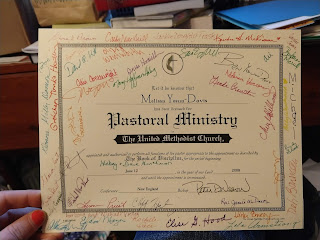Summer is here at last. Our seasonal friends (well, they aren't only friends in the summer, just friends that are here in the summer) are returning. School is out. Days are longer and warmer and there's a certain change in the air that is the promise of lots of time at the beach - but only a promise because I look at my schedule and see a rapidly approaching house deadline, several funerals/gravesides/memorials scheduled (in addition to normal Sunday morning worship) and three days of childcare for the small one (and two days for the older one) and wonder "how the heck do I keep my sanity in the midst of everything?"
There's a certain degree of intentionality with which I want to live and maintain our household, with lots of rhythm and routine (baking the bread for the week, storing the vegetables for the winter - even though I am a sucky gardener at this point, order the house, etc). I am nowhere near that yet. Right now I am in the throes of survival to get to the point where I have enough space to create the life God is inviting me into.
I'll be honest in saying that I'm in a Not Great place lately. I'm tired. The pressure to "make the most of this summer" is overwhelming from every corner. Now that the pandemic is "over", the full court press is on for activities, gatherings, Doing the Normal Things Because That's What We Do, and I find myself feeling out of step from the rest of the world which seems to have no problem returning to Normal with a vengeance. Except so many people are tired, or have reprioritized their lives and are more protective(?) with their time and energy.
I'm not sure that organizations and institutions have really grappled with the fact that the pandemic has changed the landscape of participation. Layer the realities of gun violence, the war in Ukraine, the January 6th hearings, SCOTUS decisions, and we're all just so burdened. The fabric of our society is unraveling - and to be sure, that's anxiety inducing and unsettling. So many institutions - like our churches - aren't immune to the effects. But, anxious organizations hold ever more tightly to those practices that are familiar, give comfort, and provide a sense of stability. Such adherence to the status quo doesn't actually engage with reality; it merely delays any adaptive change that might help move an organization forward and thrive in the midst of anxious times.
To be sure, many leaders had to have Adaptive Mindsets to the Max over these past few years. Yet now that the pandemic is "over", it is not the time to go running back to normal. It's time to step back, pay attention, notice where the energies are actually flowing and partner with that. I think about this particularly with churches. Discernment and curious questions are key in this time. Ask why people aren't flocking back to worship instead of throwing every band-aid solution at luring them back in. Ask why families have been so reluctant to reengage with congregational life. Ask why new leaders aren't stepping up or why new ministries aren't emerging. Ask what is happening in your community that is life-giving to folks. Spend more time there. (I can almost guarantee you that for most people, worship isn't it.)
Such principles are always easier to talk about than practice. Many leaders - pastors especially - are entrenched in systems that have Acted in Certain Ways for Generations, in communities that have established patterns of behaviors (this gets exacerbated in small towns and even more so in Unbridged Island Communities). I believe, however, that the churches that are going to make it as we move into the future are the ones that can practice this contemplative stance together and who aren't afraid to ditch the things that feel normal for the sake of a thriving body that serves the community.
